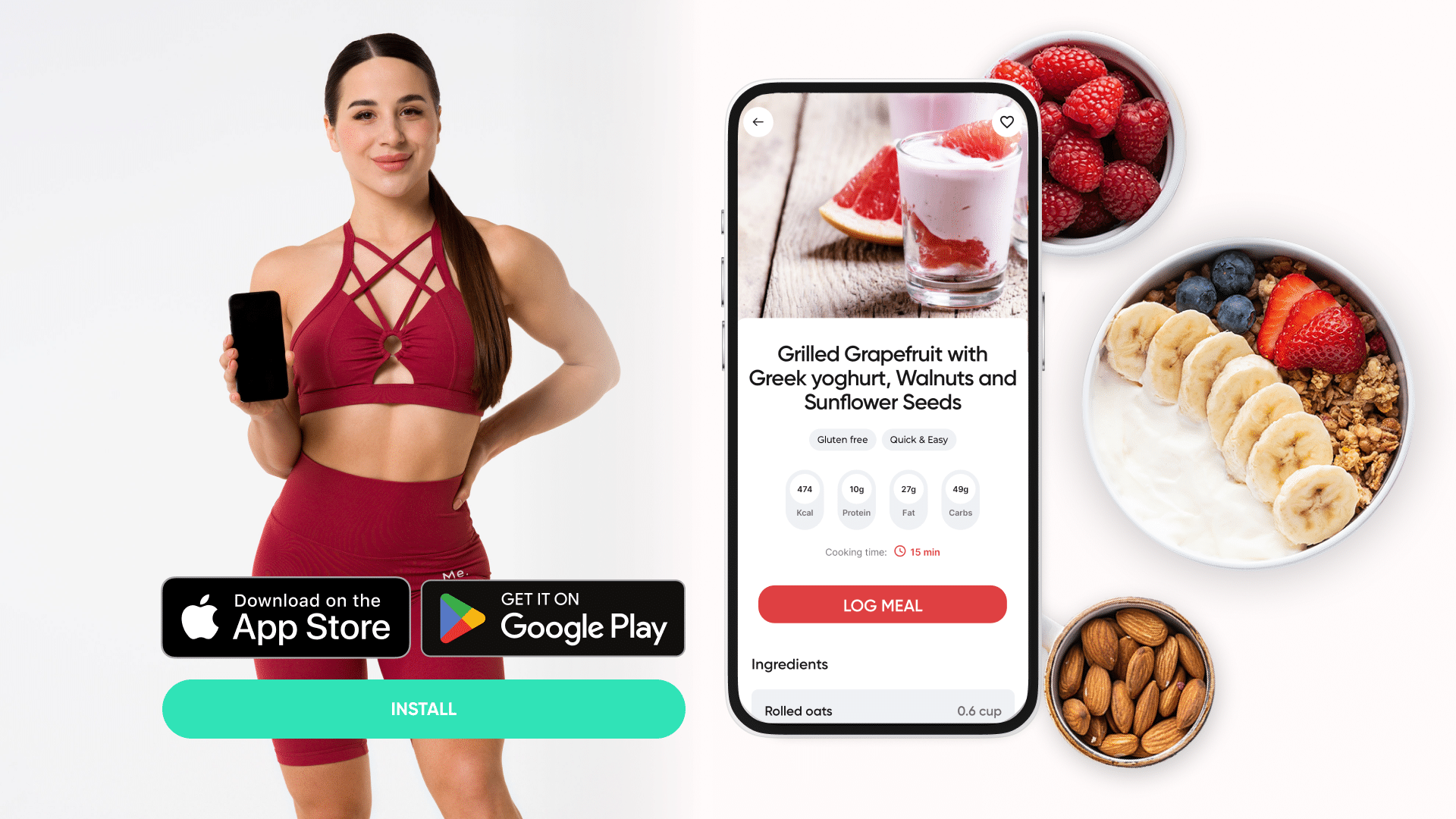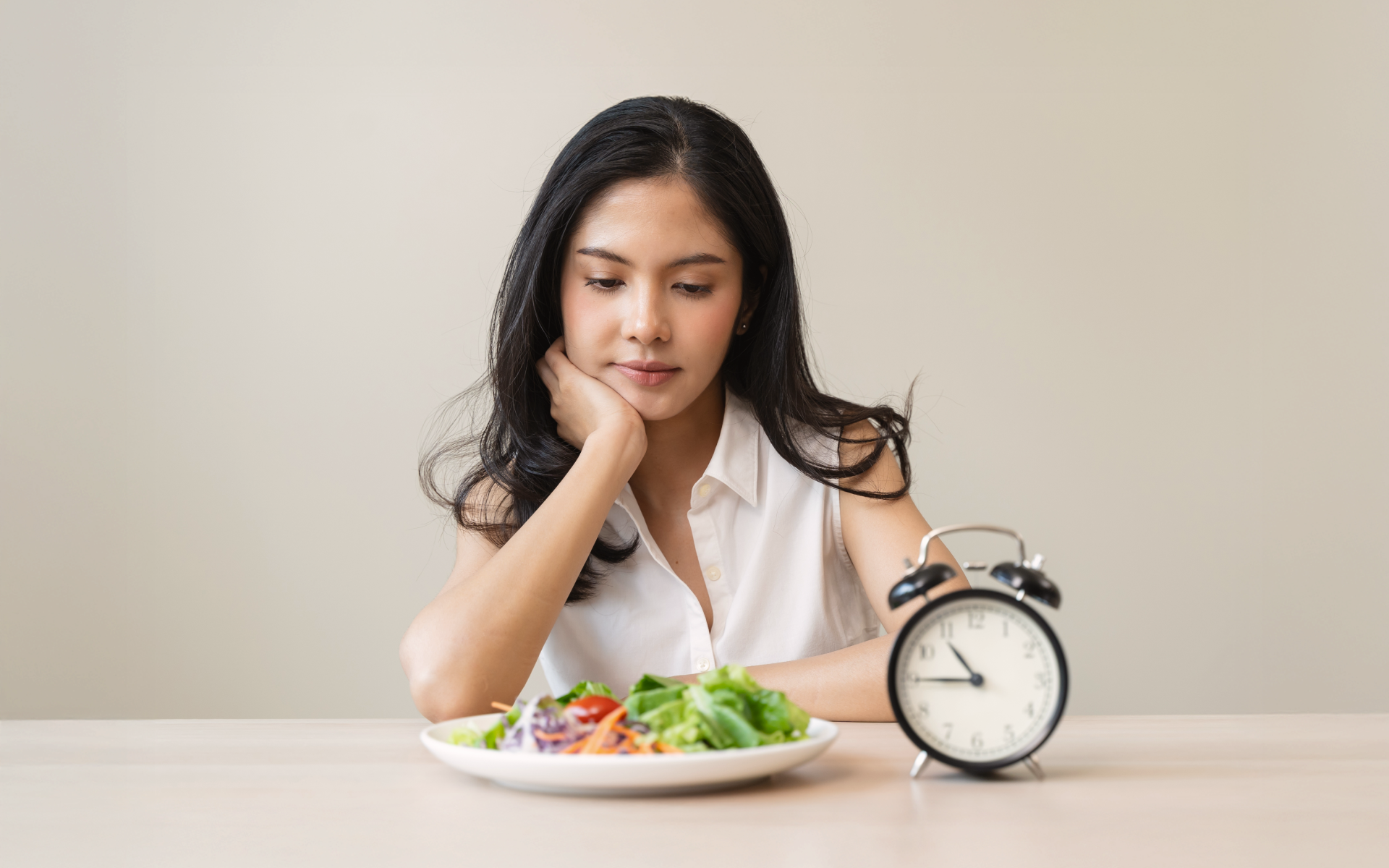According to Britannica, fasting has been part of human society, as far back as the 5th century BCE. This practice has been used for a number of reasons, varying from the ritualistic/ religious to health, medical and even ethical purposes.
The abstinence from food or drink or both can also be partial, lengthy, of short duration, or intermittent – all per the choice of the person fasting (7).
Today, intermittent fasting is the most popular kind of fasting, especially in health, fitness and nutrition circles. It has been suggested to help with multiple conditions like weight loss, improved heart and brain health, a reduced risk of Type 2 diabetes and some cancers, reduced inflammation and much more (1).
However, despite all these benefits of this practice, is fasting during menstruation advisable? Is it safe or will it have some side effects? Read on to learn more about the possible effects of fasting during menstruation and more.
Can I Fast During My Period?
Yes, you can try fasting while on your period, but it is not recommended.
During the menstrual phase of the menstrual cycle, the body goes through a lot of changes. Not only are you quite literally bleeding all day, but your hormones are fluctuating and you may also be experiencing a number of PMS symptoms.
Because your body is under a lot of stress, it is not recommended to put any more stressors on it. Fasting is a stressor during normal times – it will likely not make things any better if you are already hurting. Food cravings are also a huge part of many people’s menstrual phase – failing to listen to your body during this time is just hurting yourself and may lead to binging during the eating window.
Betterme will keep you laser-focused on your weight loss journey! Nutrient-packed meal plans, fat-blasting workouts, galvanizing challenges and much more. Try using the app and see for yourself!
Does Fasting Help Period Cramps?
While it may not be a good idea to force yourself to fast while on your period, doing this practice at other times of the month might actually help relieve painful cramps. This potential benefit of fasting was explored in one study published in 2023 (12).
In the study, researchers took 52 participants aged between 18 and 24 years all suffering from primary dysmenorrhea albeit in differing severities – from mild dysmenorrhea to severe. The women were then divided by half into two groups – an experimental group and a control group.
The women in the experimental group went on a 3 phase fasting stage namely
- Preparatory phase – Lasted a day and a half and consumed a vegetarian diet of approximately 800-1000 kcal/day
- A seven day fasting phase – Here the participants consumed 2.5 liters of water, vegetable broth, fruit or vegetable juices, and honey, providing approximately 250-500 kcal/day.
- Refeeding phase – Lasted one and a half days where the participants ate their normal diet at approximately 800-1000 kcal/day
The fasting participants were advised to abstain from consuming any stimulants like caffeine, tea, nicotine, and alcohol. And also encouraged to perform mild-to-normal physical activities like walking and yoga (meditation, breathing exercises, or relaxing postures).
The women in the control group were only provided with health-related counseling on maintaining menstrual hygiene and lifestyle practices like good sleep, diet, and exercise. They made no changes to their diets.
At the end of the study, researchers found that the women in the experimental group, compared to those in the control group, reported significantly reduced pain, cramps, nausea/vomiting, dizziness, vomiting and mood changes.
Researchers concluded that therapeutic fasting seemed like a safe and effective option in the management of primary dysmenorrhea, but also called for further future trials to examine the long-term sustainability of the results.
However, it should be noted that this type of fasting is rather extreme and all the participants were under medical surveillance. They also received naturopathic remedies to help them deal with the multiple negative side effects of water fasting while on period like fever, cold, cough, body ache, headache, nausea, and vomiting.
If you were to try this by yourself, the results may not be as those seen in the study above.
Is Fasting Bad For Women’s Hormones?
The answer to this depends on which kind of fasting you are talking about.
As seen in the study above, fasting might help alleviate period cramps and other PMS symptoms which are caused by inflammation or hormonal imbalances during the menstrual cycle. That said, it was only one small study on a very specific fasting regimen.
A literature review published in 2022 in Nutrients, found that intermittent fasting has little to no effects on the reproductive hormones in women but has some effects on the men (4).
Researchers found that while intermittent fasting reduced testosterone levels in lean, physically active, young males, it had no effect on estrogen, gonadotropins, or prolactin levels in women.
The researchers also speculated that this practice might prove to be a tool in the treatment for hyperandrogenism – the excess production of “male” sex hormones – in women with PCOS. If effective, this could help improve menstruation as well as fertility in those individuals.
However, if we are speaking about long term fasting, i.e., going all day without eating or even drinking anything, the results may be more negative than positive.
Read more: Green Tea Intermittent Fasting: Benefits and Side Effects
In a study published in the Iranian Journal of Reproductive Medicine, researchers found that month long fasting – specifically during the month of Ramadan, increased menstrual abnormalities in muslim women (3).
They found that fasting three months before, during and three months after Ramadan lead to an abnormal menstrual pattern in 11.3%, 30%, and 16.3% of participants, respectively. These abnormalities included
- Oligomenorrhea – Infrequent periods where you may regularly go for longer than 35 days between periods
- Polymenorrhea – Frequent menstruation where your cycle is shorter than 21 day and you bleed more often than others
- Hypermenorrhea – Heavy menstrual bleeding
All these issues were especially increased in those who participated in more than 15 days of fasting, which may have led to a hormonal imbalance that affected their cycle.
So according to these two studies, the type and intensity of fasting really matters on whether and how your hormones and cycle may be affected.
Fasting using the 14/10, 16/8 or even the 15/9 intermittent fasting methods might have no effect on reproductive hormones, but longer fasting which excludes food and water for prolonged periods might not be the best option.
What Are The Benefits Of Fasting While On Period?
The only evidence of the benefits of fasting on period symptoms can be seen in the very recent study published in The Cureus Journal of Medical Science above (12). As explained, researchers found that this practice may have helped to significantly reduce the women’s pain, cramps, nausea/vomiting, dizziness, vomiting and mood changes.
However, these women were under a very strict, very low calorie diet plan that needed medical supervision and led to multiple negative side effects. They also weren’t necessarily fasting during their period – they did a 10-day fasting regime and then measured its effects on symptoms during their next period.
We can’t say whether or not fasting during menstruation leads to any benefits, and it doesn’t really seem worth it if you take a step back and look at the overall picture.
Instead of going on a 30-day fasting challenge in the hopes that it will help reduce the severity of your period cramps, here are some other healthy options to try (10)
- Take painkillers – Over the counter meds like paracetamol and ibuprofen can work to manage period pain
- Do some gentle exercises – Simple exercises like yoga and tai-chi are perfect for this. Such gentle stretching exercises help reduce tension and improve blood flow which helps relax cramped muscles. If you feel up to it, try swimming, walking or cycling.
- Massage the tummy and back – It helps release tension which can provide relief against low back pain and abdominal cramps
- Use a heat pad or hot water bottle wrapped in a tea towel on your tummy – Research suggests that heat may help reduce muscle tension and relax abdominal muscles, which leads to reduced pain caused by muscle spasms (8).
- Take a warm bath or shower
If none of these options work, please seek medical assistance. The pain may be due to underlying issues such as fibroids, endometriosis or adenomyosis, a pelvic inflammatory disease, or may even be related to your contraception method (10).
BetterMe app will kick you out of the mental funk, shake off your extra weight, rid you off your energy-zapping habits, and help you sculpt the body of your dreams. Intrigued? Hurry up and change your life for the better!
Does Water Fasting Affect Menstrual Cycle?
Not particularly.
As previously stated, a study looking at the effects on intermittent or water fasting in the reproductive hormones in both men and women, found that the practice really doesn’t affect healthy women’s reproductive hormones.
However, in women with the menstrual disorder PCOS, the practice of intermittent fasting has been speculated to help lower androgen levels which may improve their menstruation and fertility – more research is still needed to ascertain this (4).
What Is The Best Time To Fast?
The best time to fast is whenever works best for you. If you are looking to get into intermittent fasting, familiarize yourself with the most common methods of IF and pick the one that works for you.
The most common methods include:
- The 16/8 – A 16 hour fasting window and an 8 hour eating window
- The 14/10 – A 14 hour fasting window and a 10-hour eating window
- The warrior diet aka 20/4 diet – Only allows a 4-hour eating window a day
- The 5:2 diet – Eat normally 5 days a week and reduce your intake to 500 kcal or 600 kcal – for women and men, respectively – on two, non consecutive days of the week.
Once you have picked your method, look at your schedule and eating habits, then tailor your preferred method to work for you. Some questions you can use to help you figure this out include,
- When do you usually start getting hungry?
- Do you tend to eat more in the morning?
- Are you busier in the mornings or later during the day?
- When do you workout and would you like to workout after eating or workout then immediately break your fast, etc.
Can I Fast On The Last Day Of My Period?
Yes, you can. Fasting on the last day of your period is probably better than fasting at the beginning or in the middle of your menstruation period.
The last day usually has little to no pain, blood flow and other symptoms, so you will likely find it easier to go long periods without eating. Remember to stay hydrated.
What To Eat After Fasting?
You can have anything you wish to eat after your fasting hours are over. However, eating too much at once might over tax your stomach.
To prevent this, you are advised to break your fast with a balanced meal of light foods/snacks/or drinks like nutritious smoothies, fresh or dried fruits, soups, yogurt, as well as soft vegetables and healthy fats like eggs and avocados.
After this, you can then move on to heavier but still healthy and nutritious food. Choose whole grains, lots of vegetables, lean protein and healthy fats over junk foods and high sugar drinks.
Do You Gain Weight On Your Period?
Yes, you do and it is absolutely normal. Weight gain is one of the many symptoms caused by periods (11, 2) and this water weight does tend to go away, just a few days after your period ends.
Periods lead to water retention and swelling, bloating, cravings and consequential overeating, all which can affect the number on the scale or how well you fit into your clothes during this time.
Read more: Intermittent Fasting and Running: A Winning Combination or a Terrible Mistake?
FAQs
How Many Hours Should A Woman Fast?
It all depends on the individual. While intermittent fasting, some women can fast for 20 hours and be okay with it. Some can’t go over 16 hours and others feel that 12 hours is too much. Fast as long as you are comfortable with it and listen to your body.
Do You Weigh More During Your Period?
Yes, you do. As shown above, periods cause weight gain, due to several factors which may increase the number on your scale. Do not fret too much over the change, it’ll go away on its own once the period is over.
How Much Weight Can You Lose In A Month On Intermittent Fasting?
It is hard to say. Weight loss is not just dependent on diet. Other factors like lifestyle habits, exercise, how much sleep you get, medication, health conditions, as well as genetics also play a role in determining how much weight you can lose in a month (6, 5).
However, the CDC states that a healthy, gradual and steady loss of 1 to 2 pounds a week (4 to 8 pounds a month) is healthy and sustainable in the long term. That said, if you are losing this much on your intermittent fasting plan, you are totally on the right track (9).
The Bottom Line
The debate on whether fasting during menstruation is good for you still doesn’t seem to have a concrete answer. Worse, the negatives seem to far outweigh the benefits. Instead of trying this for weight loss, cramp relief or something else, we suggest giving yourself grace during this period.
Take a break from fasting and eat as your body demands it. You can then go back to fasting as soon as your period is over.
DISCLAIMER:
This article is intended for general informational purposes only and does not serve to address individual circumstances. It is not a substitute for professional advice or help and should not be relied on for making any kind of decision-making. Any action taken as a direct or indirect result of the information in this article is entirely at your own risk and is your sole responsibility.
BetterMe, its content staff, and its medical advisors accept no responsibility for inaccuracies, errors, misstatements, inconsistencies, or omissions and specifically disclaim any liability, loss or risk, personal, professional or otherwise, which may be incurred as a consequence, directly or indirectly, of the use and/or application of any content.
You should always seek the advice of your physician or other qualified health provider with any questions you may have regarding a medical condition or your specific situation. Never disregard professional medical advice or delay seeking it because of BetterMe content. If you suspect or think you may have a medical emergency, call your doctor.
SOURCES
- Beneficial effects of intermittent fasting: a narrative review (2023, ncbi.nlm.nih.gov)
- Characterization of symptoms and edema distribution in premenstrual syndrome (2015, ncbi.nlm.nih.gov)
- Does Ramadan fasting has any effects on menstrual cycles? (2013, ncbi.nlm.nih.gov)
- Effect of Intermittent Fasting on Reproductive Hormone Levels in Females and Males: A Review of Human Trials (2022, ncbi.nlm.nih.gov)
- Factors Affecting Weight & Health (2023, niddk.nih.gov)
- Factors That Influence Body Weight (2003, ncbi.nlm.nih.gov)
- Fasting (2024, britannica.com)
- Heat therapy for primary dysmenorrhea: A systematic review and meta-analysis of its effects on pain relief and quality of life (2018, ncbi.nlm.nih.gov)
- Losing Weight (2023, cdc.gov)
- Period pain (2022, nhs.uk)
- Premenstrual syndrome (PMS) (2021, womenshealth.gov)
- The Long-Term Impact of Therapeutic Fasting on Primary Dysmenorrhea in Young Female Adults: A Randomized Controlled Trial (2023, ncbi.nlm.nih.gov)










